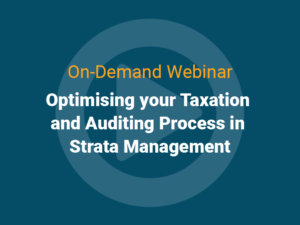How to optimise taxation and auditing in strata management
In strata management, it is necessary to establish a review process that will ensure you present accurate financial statements at every Annual General Meeting and reduce turnaround time on audits.
In our recent live webinar, we invited Aylie Brutman, Director of Strata and Real Estate at leading accounting firm, Economos to share with us her tips on optimizing taxation and auditing in strata management. She also discussed how you can utilise features in the industry-leading strata management software, Strata Master to simplify the review process. You can watch the on-demand webinar and read the run-down of tips we’ve put together below.
Free optimising taxation and auditing webinar
Learn how you can efficiently prepare for trust account audits and the taxation process in strata management. Watch this free webinar on-demand. It will cover:
- What reports should be run at year-end and what reports get audited
- How to reconcile balance sheet items
- How to review and reallocate Income & Expenditure
- What is taxable and who needs to declare income when filing an income tax
- How to report and lodge GST and what are the corresponding charges
Preparing your strata management year-end and audit list
According to Aylie, there are two key questions you should ask in preparing a year-end list for the Annual General Meeting.
- Is an audit required?
Review which plans has a year-end. You can run Quick Reports in Strata Master to get a list of year-ends.
- Who is the auditor?
Utilise the Contracts Register in Strata Master to record your auditors. This will make it easier to extract this information every time you have your AGM by running quick reports to get a list of auditors. You can also use Reminders to set up reminders for your contracts and get the list of all your plans which require audit by year end.
Financial reports required for audit and AGM purposes in strata management
To prepare accurate annual accounts for audits and AGMs you need to spend time reviewing reports. But with so many types of reports available in strata management, it’s often hard to know which ones to use for which purpose. In Strata Master, for example, there are over 75 formatted reports available. Aylie lists the following as the minimum documents that you should use in reviewing your annual accounts:
- Bank Reconciliation Report
- Balance Sheet with prior year comparison
- Income & Expenditure with the prior year and budget comparison
- Levy Positions Report
- Detailed Expenses
- General Ledger
- GST Report (if GST registered)
- ATO Integrated Client Account (from tax agent)
You might notice that the Key Statement of Financial Information is not included in the list. Aylie explains why, “This report doesn’t actually marry up to anything else. It’s just a statement of information as it’s named, but it doesn’t form part of an audit.”
Clear unpresented items on your bank reconciliation
As a strata manager, I hope you’re diligent when it comes to reconciling your bank accounts. In preparing for an audit, Aylie recommends also looking at the unpresented items on the bank reconciliation report. “Unpresented deposits are of the most concern,” says Aylie. “It could’ve been a deposit that was given over-the-counter and you’ve receipted so your system is going to think it’s in the bank. Or it could be a settlement cheque that you’ve receipted but the cheque hasn’t physically been banked.”
According to Aylie, it is best to process these deposits as soon as possible, adding that outstanding deposits more than 2 weeks old should be investigated and actioned.
Aylie also recommended that strata managers run the outstanding deposit and unpresented withdrawals report in Strata Master at the end of every month to keep on top of these items.
|
Compare with the Balance Sheet
After doing your bank reconciliation and tidying up outstanding items, it is now time to compare all those amounts on the balance sheet against the following supporting documentation:
- Levy Positions
The Levy Positions Report provides a snapshot of your levies, and the only way your balance sheet and levy positions don’t match is if someone has journaled to the clearing account.
In Strata Master a notification is set up to alert a user if they try to journal to the levies receivable account. However, even with safeguards mismatches still happen – often with unallocated funds. Aylie recommends reviewing the general ledger report to see if somebody has actually done a journal to those accounts against the actual payment account on the balance sheet.
- Outstanding Creditors
If you get an outstanding creditors listing from Strata Master, and it doesn’t match the balance sheet, it is most likely someone has journaled or made a direct payment out of the clearing account – and they will never reconcile until that problem has been fixed. The best practice is to resolve the issue early on as it’s going to be a lot more complicated and difficult to work out where it came from if you dismiss it for years.
Aylie recommends that you should ensure this is reconciled even if it’s a small building and they don’t get an audit: “just make sure you reconcile before you hand them over to a manager to have an AGM.”
- Bonds
As bonds are directly refundable, a lot of people like to keep them on the balance sheet as they are a liability.
- Loans
Make sure your loan balances on the balance sheet equal the loan statement.
Reviewing income
Another area you need to look at when reviewing annual accounts is income. The reports that are your friends here are the Income and Expenditure Report and General Ledger. Here are key items to take note of when reviewing Income:
- Levies
Check your minutes to make sure levies were raised correctly. If there has been more than one special levy raised during the year in the same fund you may choose to manually journal the special levy income to separate accounts for more clarity.
“Levies are going to be the main portion of your income. So you should be checking your minutes to make sure the levies were done correctly and you haven’t missed any special levy somewhere along the line”, says Aylie.
- GST Registration
Is your total income over $150,000? If the plan is not registered for GST you may need to register it – speak with your tax agent to get advice and take the appropriate action.
- Other income
Review any other income and ensure it is allocated correctly.
- Insurance claims
Ensure that wherever you’re paying the insurance claims expense from is the same fund where you deposit the insurance claim into. Aylie says that strata managers often forget that the expenses for the insurance claims are generally made far before the claim is actually settled, so it can be quite easy to make the mistake of depositing the funds into the wrong place.
Reviewing expenses
This is where you’ll spend a large portion of your time – and for good reason. The more you can do before handing this over to the auditor, the more time you can save going back and forth with the auditor.
The reports required for audit are the I&E Report, Detailed Expenses Report and General Ledger. There are other reports in Strata Master that have some of this information, but the detailed expenses report is the one that matches up exactly with the expenses on the I&E report, giving you more detail as to what makes up those expenses. It will include any journals that have been made and will also show you where items have been reallocated.
To ensure you’re reviewing your expenses documents correctly, Aylie shares a few tips:
- Compare codes used to budget accounts
- Check if invoices have been coded to the correct fund
- Check each code on the Detailed Expenses Report for accuracy.
If you’re using Strata Master, Aylie recommends utilising the Search/Edit Transaction functionality to easily identify what needs to be moved. There’s also the Auto Reversal Journal functionality to process invoices in the current financial period for expenses that may relate to a future financial period. This is especially useful for accruals and prepayments to reflect the expenditure in the appropriate financial period. - Review special levies – Deficits between funds often happen because of special levies and expenditure hasn’t been allocated proportionately to the way the special levies were raised.
- Check if GST is correct – all you need to do is run your eye down the column and make sure everything looks ok.
Managing GST in Strata Management
It always recommended to audit a GST registered building to help you avoid under-declaring income or non-lodgment of GST, both of which the ATO can charge the plan for. Simply put, the cost of the audit is significantly cheaper than the fine from the tax office, so best to keep on top of your GST. Aylie shared a few things to remember when it comes to reviewing GST:
- Consider registering for GST if the plan’s budgeted turnover is near $150,000.
Aylie recommends being proactive when registering for GST to account for any special levies throughout the year that will add to your income. “It’s a lot easier to get ahead and to register beforehand than it is to retrospectively go back and register for GST,” says Aylie.
- Lodging GST quarterly vs annually makes it easier for you to reconcile.
Lodging quarterly will also allow you to review transactions more clearly. In Strata Master, for example, you can run a GST report quarterly, making it easier to review total receipts with GST and lodge it to the ATO.
- If possible, register your GST under the cash method.
Registering for the cash method means you’re only paying GST on the actual receipts that you received. This is as opposed to accrual/ non-cash wherein one 11th of the levies you’re raising is going to be paid to the ATO whether you have received them or not – which can make for problematic cashflows.
- Discrepancies between the GST report and the Balance Sheet can be caused by the following:
- Opening balances
- Not making the payment properly or receipting the refund properly
- Erroneous correction of a transaction
- Backdating a transaction
Income Tax
Strata Schemes are considered a public company for tax purposes and must lodge a tax return every financial year. Tax Ruling 2105/03 explains strata tax in detail, but Aylie shared a few basics to remember when it comes to income tax.
Mutual income vs non-mutual income
Strata plans need to pay income tax if they receive non-mutual income – which is income coming from non-owners such as status certificate fees, inspection fees, bank interests, etc. Mutual income on the other hand is not considered taxable income, which means things like levies or interest on overdue levies is not assessable for income tax.
Tax rate
Strata schemes are subjected to 30% income tax rate (30% as the standard rate for companies with turnover off less than $2 million per year).
Disclosure to owners
When it comes to income tax, your job as a strata manager is to advise owners what they need to disclose to their agents, to their tax agents or their accountant. Aylie shares a couple of different ways that you can do that.
- Letter
Utilise mail merge fields in Strata Master to easily create a tax disclosure template and send in bulk to owners.
- Spreadsheet (Tax schedule)
You can also use a spreadsheet to create a template of lots with their unit entitlements and then calculate out the individual owner’s obligation. Just remember not to put names on those spreadsheets due to privacy.
Who can prepare and lodge tax returns?
- Registered BAS Agent
- Registered Tax Agent
What fees can be charged by the strata manager for tax work?
Strata managers are not necessarily required to lodge tax returns. However, if you are concerned about generating income for work related to preparing tax returns, Aylie shares that tax agents can allot for an item (such as prepared documentation for tax agent), in the agent’s schedule when they issue an invoice to the plan for the tax return. This is where you can charge your fee but take note that the tax practitioners will dictate this fee. Having mentioned that, Aylie does recommend taking caution. “At the end of the day, it’s about liability. If you make a mistake, your PI insurance isn’t going to cover you as you are not a tax agent,” she said.
Learn more on audit and taxation in strata management
To get a better understanding of preparing your reports for audit and AGM, you can watch the full webinar for free here.
You can also register for our GST Preparation and Submission online class, as well as other Strata Master courses, in the MRI Training Academy.
Unlocking efficiency: Leveraging managed services for streamlined property management
Explore the transformative power of Managed Services in the property management sector. In this webinar, we’ll share: Enhancing operational efficiency Leveraging expertise for streamlined data management Maximising scalability and flexibility …



